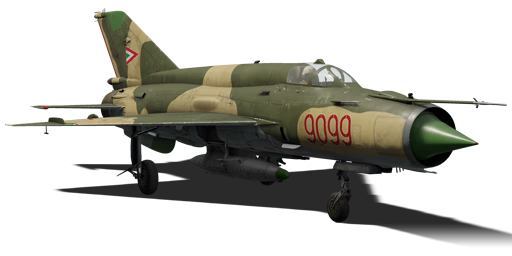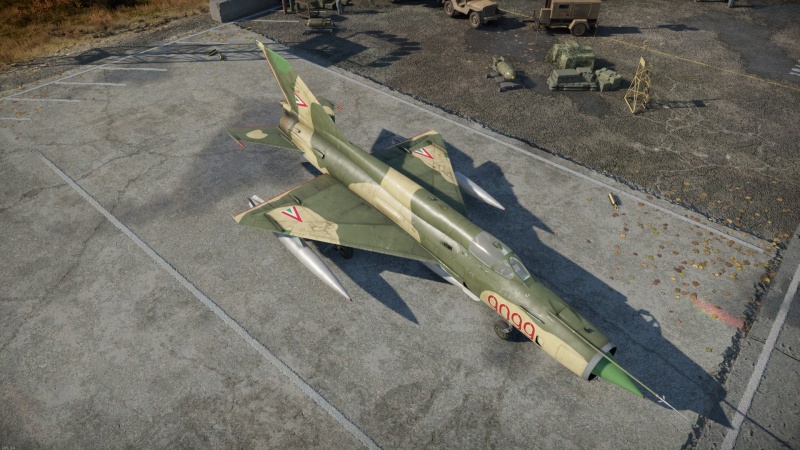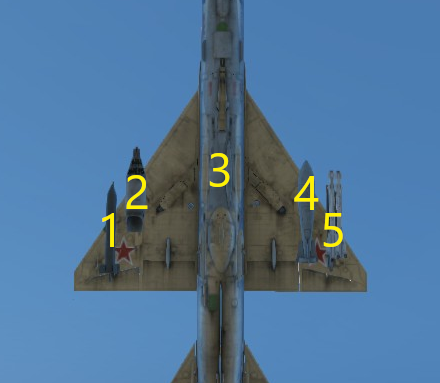Difference between revisions of "MiG-21bis-SAU (Italy)"
(→Description: New Description Project) (Tag: Visual edit) |
(→Description) |
||
| Line 11: | Line 11: | ||
== Description == | == Description == | ||
<!-- ''In the description, the first part should be about the history of and the creation and combat usage of the aircraft, as well as its key features. In the second part, tell the reader about the aircraft in the game. Insert a screenshot of the vehicle, so that if the novice player does not remember the vehicle by name, he will immediately understand what kind of vehicle the article is talking about.'' --> | <!-- ''In the description, the first part should be about the history of and the creation and combat usage of the aircraft, as well as its key features. In the second part, tell the reader about the aircraft in the game. Insert a screenshot of the vehicle, so that if the novice player does not remember the vehicle by name, he will immediately understand what kind of vehicle the article is talking about.'' --> | ||
| − | In 1977, the Hungarian People's Republic Air Force started receiving | + | In 1977, the Hungarian People's Republic Air Force started receiving the [[MiG-21bis]] to supplement their fighter-interceptor fleet alongside their recently acquired [[MiG-21MF (Italy)|MiG-21MF]] fleet. Hungary would receive exactly 63 of the type, with 39 of them being the "Fishbed-L" variant, equipped with the Lazur-M GCI (Ground Controlled Intercept) guidance system. The other 24 would be the "Fishbed-N" variant, equipped with the Polyot-OI landing system instead. To differentiate the two variants, the aircraft received unique names in export service, with the Polyot equipped variant being called '''MiG-21bis-SAU''' (''Sistema Avtomaticheskovo Upravleniya''). The only way to visually tell apart the two aircraft is by a single antenna under the forward fuselage, which is missing on one of the variants due to its different guidance system, or by the countermeasure system; the Lazur equipped MiG-21bis had the wiring required for build-in ASO-2 countermeasure dispensers in the rear of the fuselage, while the Polyot equipped versions did not have this wiring and required an external SPS-141 countermeasures pod. |
| − | Introduced in [[Update "Alpha Strike"]], the '''{{Specs|name}}''' is a Hungarian aircraft found in the Italian tech tree, and builds upon the playstyle of the | + | Introduced in [[Update "Alpha Strike"]], the '''{{Specs|name}}''' is a Hungarian aircraft found in the Italian tech tree, and builds upon the playstyle of the previous [[MiG-21MF (Italy)|MiG-21MF]] in the tree, relying a lot more on its incredible flight performance to utilize hit-and-run tactics against unsuspecting enemies, and to dogfight its way out of most trouble it finds its way in. The MiG-21bis may have great flight performance and engine power, but lacks in most other departments. Being a delta wing, its energy retention is abysmal, although that problem is slightly mitigated by the very powerful engine, which can quickly regain speed if the aircraft safely disengages and flies in a straight line. The aircraft's avionics and suspended weaponry is where the largest let-down is. While other aircraft at your battle rating range will have pulse-doppler radars, powerful missiles with IRCCM, and very informative RWR systems, the MiG-21bis has none of that. Instead, you get what is easily one of the worst dedicated radar sets at this battle rating, subpar missiles, a complete lack of BVR capability, and the weak SPO-10 RWR system. All in all, the MiG-21bis falls under the same loop of the late Fishbed family, relying a lot more on the skill of the pilot due to its strong flight performance and weak systems. It is truly a hard plane to learn, but a very rewarding one if mastered correctly. One must keep in mind in mixed battles that the weight and drag of the SPS-141 Countermeasures pod makes the Bis-SAU very slightly (so slightly that its barely noticeable) worse in flight performance than the Lazur equipped versions with built-in flares, so avoid extended dogfights with Lazur equipped Fishbeds. |
== General info == | == General info == | ||
Revision as of 17:47, 29 April 2024
| This page is about the fighter aircraft MiG-21bis-SAU (Italy). For other versions, see MiG-21 (Family). |
Contents
Description
In 1977, the Hungarian People's Republic Air Force started receiving the MiG-21bis to supplement their fighter-interceptor fleet alongside their recently acquired MiG-21MF fleet. Hungary would receive exactly 63 of the type, with 39 of them being the "Fishbed-L" variant, equipped with the Lazur-M GCI (Ground Controlled Intercept) guidance system. The other 24 would be the "Fishbed-N" variant, equipped with the Polyot-OI landing system instead. To differentiate the two variants, the aircraft received unique names in export service, with the Polyot equipped variant being called MiG-21bis-SAU (Sistema Avtomaticheskovo Upravleniya). The only way to visually tell apart the two aircraft is by a single antenna under the forward fuselage, which is missing on one of the variants due to its different guidance system, or by the countermeasure system; the Lazur equipped MiG-21bis had the wiring required for build-in ASO-2 countermeasure dispensers in the rear of the fuselage, while the Polyot equipped versions did not have this wiring and required an external SPS-141 countermeasures pod.
Introduced in Update "Alpha Strike", the ◔MiG-21bis-SAU is a Hungarian aircraft found in the Italian tech tree, and builds upon the playstyle of the previous MiG-21MF in the tree, relying a lot more on its incredible flight performance to utilize hit-and-run tactics against unsuspecting enemies, and to dogfight its way out of most trouble it finds its way in. The MiG-21bis may have great flight performance and engine power, but lacks in most other departments. Being a delta wing, its energy retention is abysmal, although that problem is slightly mitigated by the very powerful engine, which can quickly regain speed if the aircraft safely disengages and flies in a straight line. The aircraft's avionics and suspended weaponry is where the largest let-down is. While other aircraft at your battle rating range will have pulse-doppler radars, powerful missiles with IRCCM, and very informative RWR systems, the MiG-21bis has none of that. Instead, you get what is easily one of the worst dedicated radar sets at this battle rating, subpar missiles, a complete lack of BVR capability, and the weak SPO-10 RWR system. All in all, the MiG-21bis falls under the same loop of the late Fishbed family, relying a lot more on the skill of the pilot due to its strong flight performance and weak systems. It is truly a hard plane to learn, but a very rewarding one if mastered correctly. One must keep in mind in mixed battles that the weight and drag of the SPS-141 Countermeasures pod makes the Bis-SAU very slightly (so slightly that its barely noticeable) worse in flight performance than the Lazur equipped versions with built-in flares, so avoid extended dogfights with Lazur equipped Fishbeds.
General info
Flight performance
Describe how the aircraft behaves in the air. Speed, manoeuvrability, acceleration and allowable loads - these are the most important characteristics of the vehicle.
| Characteristics | Max speed (km/h at _,___ m) |
Max altitude (metres) |
Turn time (seconds) |
Rate of climb (metres/second) |
Take-off run (metres) | |||
|---|---|---|---|---|---|---|---|---|
| AB | RB | AB | RB | AB | RB | |||
| Stock | ___ | ___ | 16000 | __._ | __._ | __._ | __._ | ___ |
| Upgraded | ___ | ___ | __._ | __._ | __._ | __._ | ||
Details
| Features | |||||
|---|---|---|---|---|---|
| Combat flaps | Take-off flaps | Landing flaps | Air brakes | Arrestor gear | Drogue chute |
| _ | _ | _ | _ | _ | _ |
| Limits | ||||||
|---|---|---|---|---|---|---|
| Wings (km/h) | Gear (km/h) | Flaps (km/h) | Max Static G | |||
| Combat | Take-off | Landing | + | - | ||
| 1365 | 700 | ___ | ___ | ___ | ~__ | ~__ |
| Optimal velocities (km/h) | |||
|---|---|---|---|
| Ailerons | Rudder | Elevators | Radiator |
| < ___ | < ___ | < ___ | - |
Engine performance
| Engine | Aircraft mass | |||||
|---|---|---|---|---|---|---|
| Engine name | Number | Basic mass | Wing loading (full fuel) | |||
| _____ | _ | _,___ kg | ___ kg/m2 | |||
| Engine characteristics | Mass with fuel (no weapons load) | Max Gross Weight | ||||
| Weight (each) | Type | _m fuel | __m fuel | __m fuel | ||
| ___ kg | ___ | _,___ kg | _,___ kg | _,___ kg | _,___ kg | |
| Maximum engine thrust @ 0 m (RB/SB) | Thrust to weight ratio @ 0 m (___%/WEP) | |||||
| Condition | 100% | ___%/WEP | _m fuel | __m fuel | __m fuel | MGW |
| Stationary | ___ kgf | ___ kgf | _.__ | _.__ | _.__ | _.__ |
| Optimal | ___ kgf (_ km/h) |
___ kgf (_ km/h) |
_.__ | _.__ | _.__ | _.__ |
Survivability and armour
Examine the survivability of the aircraft. Note how vulnerable the structure is and how secure the pilot is, whether the fuel tanks are armoured, etc. Describe the armour, if there is any, and also mention the vulnerability of other critical aircraft systems.
Modifications and economy
Armaments
| Ballistic Computer | ||||
|---|---|---|---|---|
| CCIP (Guns) | CCIP (Rockets) | CCIP (Bombs) | CCRP (Bombs) | EEGS |
| |
|
|
|
|
Offensive armament
The MiG-21bis-SAU (Italy) is armed with:
- 1 x 23 mm GSh-23L cannon, belly-mounted (250 rpg)
Suspended armament
The MiG-21bis-SAU (Italy) can be outfitted with the following ordnance:
| 1 | 2 | 3 | 4 | 5 | ||
|---|---|---|---|---|---|---|
| 100 kg OFAB-100 bombs | 4 | 4 | ||||
| 250 kg FAB-250M-62 bombs | 1 | 1 | ||||
| 500 kg FAB-500M-62 bombs | 1 | 1 | ||||
| ZB-500 incendiary bombs | 1 | 1 | ||||
| S-5K rockets | 16 | 16, 32 | 16, 32 | 16 | ||
| S-24 rockets | 1 | 1 | 1 | 1 | ||
| R-3R missiles | 1 | 1 | 1 | 1 | ||
| R-3S missiles | 1 | 1 | 1 | 1 | ||
| R-13M1 missiles | 1 | 1 | 1 | 1 | ||
| R-60MK missiles | 1, 2 | 1 | 1 | 1, 2 | ||
| Countermeasures | 64 | |||||
| 490 l drop tanks | 1 | 1 | 1 | |||
| Maximum permissible weight imbalance: 570 kg | ||||||
| Default weapon presets | |
|---|---|
| |
Usage in battles
Describe the tactics of playing in the aircraft, the features of using aircraft in a team and advice on tactics. Refrain from creating a "guide" - do not impose a single point of view, but instead, give the reader food for thought. Examine the most dangerous enemies and give recommendations on fighting them. If necessary, note the specifics of the game in different modes (AB, RB, SB).
Pros and cons
Summarise and briefly evaluate the vehicle in terms of its characteristics and combat effectiveness. Mark its pros and cons in the bulleted list. Try not to use more than 6 points for each of the characteristics. Avoid using categorical definitions such as "bad", "good" and the like - use substitutions with softer forms such as "inadequate" and "effective".
Pros:
Cons:
History
Describe the history of the creation and combat usage of the aircraft in more detail than in the introduction. If the historical reference turns out to be too long, take it to a separate article, taking a link to the article about the vehicle and adding a block "/History" (example: https://wiki.warthunder.com/(Vehicle-name)/History) and add a link to it here using the main template. Be sure to reference text and sources by using <ref></ref>, as well as adding them at the end of the article with <references />. This section may also include the vehicle's dev blog entry (if applicable) and the in-game encyclopedia description (under === In-game description ===, also if applicable).
Media
Excellent additions to the article would be video guides, screenshots from the game, and photos.
See also
Links to the articles on the War Thunder Wiki that you think will be useful for the reader, for example:
- reference to the series of the aircraft;
- links to approximate analogues of other nations and research trees.
External links
| Mikoyan-Gurevich Design Bureau (Микоя́н и Гуре́вич Опытное конструкторское бюро) | |
|---|---|
| Fighters | MiG-3-15 · MiG-3-15 (BK) · MiG-3-34 |
| I-225 | |
| Jet fighters | MiG-9 · MiG-9 (l) |
| MiG-15 · MiG-15bis · MiG-15bis ISh | |
| MiG-17 | |
| MiG-19PT | |
| MiG-21F-13 · MiG-21PFM · MiG-21S (R-13-300) · MiG-21SMT · MiG-21bis | |
| MiG-23M · MiG-23ML · MiG-23MLD | |
| MiG-27M · MiG-27K | |
| MiG-29 · MiG-29SMT | |
| Export/Licensed | ␗MiG-9 · ␗MiG-9 (l) |
| ◊MiG-15bis · ◔MiG-15bis · J-2* | |
| MiG-17AS · ◔MiG-17PF · J-4* · Shenyang F-5* | |
| ◊MiG-19S · J-6A* | |
| ◄MiG-21 SPS-K · ◊MiG-21MF · ◔MiG-21MF · ▄MiG-21bis · ◔MiG-21bis-SAU · ◊MiG-21bis-SAU · ◊MiG-21 "Lazur-M" · ▄MiG-21 Bison · J-7II** | |
| ◊MiG-23BN · ◊MiG-23MF · ◔MiG-23MF · ◊MiG-23MLA | |
| ◔MiG-29 · ◊MiG-29 · ◄MiG-29G | |
| *Licensed and domesticated with Chinese designations. | |
| **Unlicensed, reverse-engineered and domesticated with Chinese designations. | |
| See Also | Shenyang · Chengdu |
| Italy jet aircraft | |
|---|---|
| Aerfer | Sagittario 2 · Ariete |
| Fiat | G.91 pre-serie · G.91 R/1 · G.91 R/4 (Portugal) · G.91 Y · G.91 YS |
| AMX International | AMX · AMX A-1A (Brazil) |
| Panavia | Tornado ADV · ▄Tornado IDS · ▄Tornado IDS (1995) |
| Foreign: | |
| Vampire | Vampire FB 52A |
| F-84 | ▄F-84F · ▄F-84G-21-RE |
| F-86 | CL-13 Mk.4 · ▄F-86K |
| F-104 | ▄F-104G · F-104S · ▄F-104S TAF (Turkey) · F-104S.ASA |
| F-16 | ▄F-16A ADF |
| AV-8 | ▄AV-8B Plus |
| Hungary | |
| Mikoyan-Gurevich | ◔MiG-15bis · ◔MiG-17PF · ◔MiG-21MF · ◔MiG-21bis-SAU · ◔MiG-23MF · ◔MiG-29 |
| Ilyushin | ◔IL-28 |
| Sukhoi | ◔Su-22M3 |
| Saab | ◔JAS39EBS HU C |






